Welcome to the Mother City!
Arriving at Cape Town International Airport, you are met by your private guide for your transfer to the V&A Waterfront, your home for the next few nights.
Please note that this transfer is based on a group arrival, individual arrivals can be accommodated at a surcharge.
You have the afternoon at leisure to relax and unwind before you are escorted to the Grande Cafe Africa, for sundowner drinks, light snacks and a trip briefing.
Dinner is spent at leisure tonight.
Check-in: 14:00
Take in views of the beautiful waters of the Atlantic Ocean and the private marina from the Radisson Blu Hotel Waterfront in Cape Town. This seaside hotel is close to the city center, as well as all the big cultural offerings. The striking ocean views set the stage for a memorable stay in Cape Town. Wake to the sound of gentle waves breaking on the shore before embarking on a day of exploration. Take our complimentary shuttle bus to and from the Victoria & Alfred Waterfront – a popular shopping, dining and entertainment area. Other nearby attractions include Table Mountain and Robben Island, which is home to one of the city's most visited museums.
16:00 Grand Africa Café & Beach (2h)
Grand Africa Café & Beach embraces a free-spirited beach café culture, nestled poignantly on the sea-front shoreline and flaunting her majestic views of the mighty Atlantic and Robben Island.
With iconic style and playful luxury, Grand captures the quintessential charm and colloquial effervescence of the bustling city vibe while offering a quaint and relaxing escape, ‘a world away’ in the heart of Cape Town’s social mile.
With a choice of five bars, ocean-view decks, nine private function venue areas, and on-beach dining, you’re sure to find the perfect spot to capture that unforgettable magic, that is simply Grand.
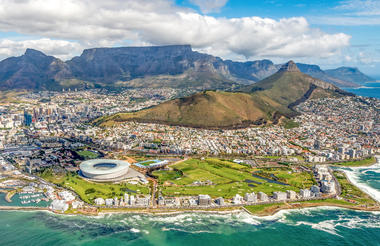
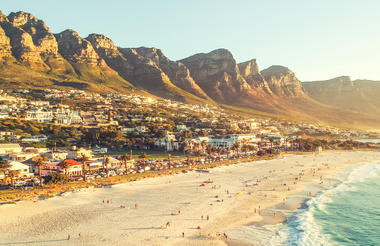
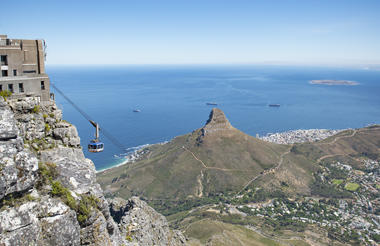
09:00 Urban Safari - A Full Day Cape Town City Walking Tour (8h)
Enjoy a delicious breakfast at the hotel, overlooking the Atlantic ocean.
Join Martin for a full briefing about the days activities and locations we will visit, the correct protocols for taking photographs and safety considerations, before embarking on your Urban Safari.
We start off with a stroll through the Bo-kaap, known for its brightly coloured houses and beautiful cobbled streets. We stop to visit the Cape's oldest spice emporium and samble some local delicacies while the local store owners regale you with tales of the Cape Town of old. The Bo-Kaap is situated at the foot of Signal Hill, on the fringe of the city centre and dates back to the 1760's when numerous rental houses were built and leased to slaves. This community were known as Cape Malays, and were brought from Malaysia, Indonesia and the rest of Africa to work in the Cape. To this day, the houses are a mix of Cape Dutch and Georgian architecture in distinctive multi-coloured rows on steeply cobbled roads. The choice of colour is said to be attributed to the fact that while on lease, all the houses had to be white, and when this rule was eventually lifted and the slaves were allowed to buy the properties, all the houses were painted bright colours by their owners as an expression of their freedom.
Our urban safari continues to the modern and ultra hip suburb of Woodstock. From a once bustling seaside resort to a semi-industrial area and now a bustling hub of creativity and hip coffee shops, the suburb of Woodstock just outside the Cape Town CBD has seen its fair share of re-invention over the years. Recently street art has been adding another voice to the transformation process.
It’s hard to imagine that in the middle of the 19th Century, Woodstock, the semi-industrial area on the outskirts of Cape Town’s CBD, was once a seaside resort comparable to Brighton in the UK. However, in the years that followed, Woodstock became increasingly industrialised, especially after the substantial land reclamations in the 1950s that robbed the suburb of its beach. With the coming and going of industry, crime started creeping into the area with the area a definite no-go zone for tourists and even locals.
However, since the early 1990s Woodstock has undergone a gradual urban renewal process, especially in the last decade or so. These days Woodstock is undoubtedly the creative hub of the Mother City, with factories making way for artist studios, furniture showrooms and creative agencies occupying much of the area, and hip and trendy coffee shops and eateries lining its streets. It is here that we meet Juma, the man with all the insight into this ecclectic suburb.
Juma is a friendly and cheerful host with an in-depth knowledge of the art that adorns the walls and buildings of Woodstock, as well as the artists who created them. His insightful stories provide an understanding not only of the art, but of the meaning behind it and the role it plays in the area’s transformation. The majority of the art on display in the streets of Woodstock has some type of transformative message, from nature conservation to social justice, and general upliftment of the community, its social commentary that is often provocative. The array of work is as vast and diverse as the artists that created them, both local and international, young and old, unknown and world-famous, who have come to put their mark on the walls of Woodstock.
The nature of street art means that it is always changing, with new buildings, alterations, new gates and fences, and even vandals obscuring the art, and in some cases changing the meaning of what the artist originally intended. It’s this element that is often most fascinating to see, especially with Juma’s perspective. It also means that the tour is ever changing.
We stop for a bite to eat at the Old Biscuit Mill. The Old Biscuit Mill boasts some of the city’s best creative enterprises, where local and artisanal goods and craftsmanship are on constant display.
Find one-of-a-kind fashions, quirky travel mementos, local artisanal products and gifts and an impressive trove of other unique Cape Town Treasures. Encounter eclectic artworks and intriguing designs showcased by the dynamic community of artists, designers and craftsmen that call the Mill home. This is where décor, fashion, furniture and lifestyle boldly take centre stage. The proud home of some of South Africa’s finest and most celebrated dining establishments, the Mill is a real foodie hotspot. Highlights include award-winning eateries and the best pizzas, pastas and burgers in town. You’ll also find an inviting wine outlet showcasing a carefully curated selection of local wines, craft beers and gin.
12:00 Lunch at the Pot Lock Club
The Potluck Club has been satisfying customers with global inspired small plates since 2012.
The eatery takes on modern industrial elegance, where natural materials add a touch of cosiness. A space for people from all walks of life to feel comfortable and inspired.
Chef Luke Dale Roberts is a name synonymouse with the finest, most creative and innovative cuisine in Africa. The focal point, which has become signatore to Luke's restaurants is the open plan kitchen which is illuminated by studio lighting, giving the impression of a stage. Expect incredible delicacies, such as Pot Luck Club Fish Sliders, Linefish Sashimi, Grilled Octopus, Lamb roast and Celeriac Dauphinoise, Peanut Butter bombs, Macadamia Nougat and Raspberry Sorbet, to mention but a few.
After lunch, we make our way to Table Mountain where we will ascend the Mountain via the Aerial Cableway. Table Mountain is possibly the most Iconic landmark in Southern Africa, a UNESCO World Heritage site, it is a bucket list item for any traveller. From here, your guide will point out the historical landmarks visited in the morning and from a birds eye-view put the history, culture and heritage of this incredible city that has evolved into a melting pot of cultures.
Time permitting, we will end the day with a stroll through the Company's Garden. This oasis in the middle of a bustling city is the green lung of Cape Town, and has a significant role in the history of the City. Originally built as a refreshment station for the trade route that rounded the tip of African between Europe and the east. Ships sent by the DEIC would stop by after months at sea and stock up on fresh produce grown in the garden, hence, "The Company's Garden"
In the late afternoon, you return to your hotel, where the rest of the evening is spent at leisure.
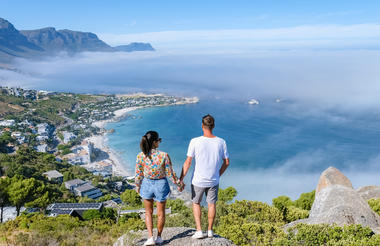
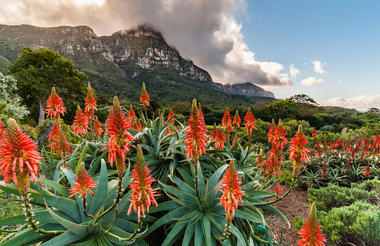
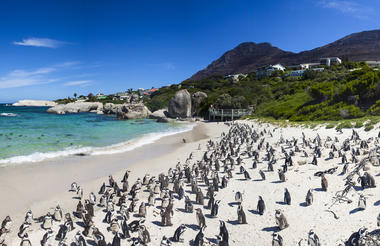
Start at 09:00. Coast to Coast along the Cape Peninsula (8h)
After breakfast, Martin will check your gear for the day and your comfortable walking shoes, for our exciting action packed day excursion. Enjoy the journey as we make our way along arguably one of the most picturesque routes in Africa.
We pass through the coastal suburbs of Camps Bay, Llandudno and Hout Bay. In Hout Bay we stop to visit a local market and spend some time interacting with the local artisans. Leaving Hout Bay we continue our journey over Chapmans Peak Drive this 9km route, skirts Chapmans Peak, the 593m high southerly extension of Constantia Berg and follows the rocky coastline to unfold breath-taking views in both directions.
Arriving at the Cape of Good Hope we get out of the vehicle and explore this beautiful section of the Table Mountain National Park on foot – along its amazing coastline you will get up close to the beautiful fynbos. We also have the possibility of encountering some of the wildlife that calls this unique piece of the peninsula home, which can include ostrich, various antelope, baboons and the Cape Mountain zebra.
The Cape of Good Hope is still one of the two world-renowned landmarks within the Table Mountain National Park, and a familiar attraction that draws thousands of visitors to Cape Town each year.
We take a stroll up to the old lighthouse, the hike is short but steep along a well hewn path. The walk is approximately 2km and offers some of the most beautiful mountain and ocean views in the world. The Old Cape Point Lighthouse decommissioned when the Portuguese liner, the Lusitania, crashed under its guidance to rest in many pieces on the ocean floor. Thus the Old Cape Point Lighthouse was replaced with the new, improved and ocean fresh beacon of light imaginatively named the New Cape Point Lighthouse. The more adventurous can also walk down the steep steps to the New Lighthouse, taking you away from the crowds.
We leave the lighthouses behind us as our day progresses towards the naval town of Simons Town – where we will stop for a bite to eat at one of the vibrant restaurants. Quaint buildings line the historial mile, dotted with great antique shops, artisanal ice cream parlours and wonderful restaurants overlooking the ocean. We will walk through this quaint seaside town, with the option to view calving southern right whales in the bay between June and November.
14:00 Lunch at Harbour House - Kalk Bay (1h30min)
Situated on the water’s edge in the picturesque harbour of Kalk Bay, this branch boasts exquisite views of the working harbour, False Bay and the Hottentots Mountain Range. Harbour House Kalk Bay specialises in corporate functions, tour groups and wedding receptions – offering world-class cuisine and wine, beautiful décor and friendly, professional service.
After lunch we visit the comical penguins of Boulders Beach. The ancient granite boulders from which the beach gets its name, protects this spectacular beach from the wind and large waves – making it a wonderful swimming spot. The white soft sands and warm(ish) waters are not the only draw card, the local inhabitants – African Penguins in their thousands are a sight to behold. African Penguins used to be known as jackass penguins because of their distinctive braying sounds, and they are the only penguins found on the continent. Commercial fishing, marine pollution and habitat destruction have taken their toll on this colony. In 1910 it was estimated that there were approximately one-and-a-half million African Penguins; a century later, the aquatic bird was classified as an endangered species. By 1982 there were only two breeding pairs remaining, and it is only through concentrated conservation efforts that the colony at Boulders Beach has increased to approximately 3000 birds in recent years.
Weather permitting and for the more adventurous pack in your swimming costumes, as after lunch you have the option to take a quick dip in the waters surrounding Boulders Beach.
The late afternoon sees us taking a slow drive back to the city where the evening is spent at leisure.

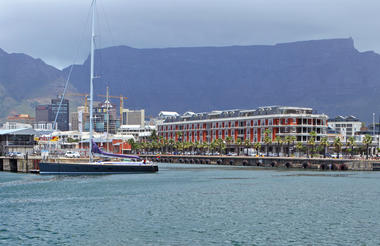

Start at 08:00 A meander through the Cape Winelands (9h)
Enjoy a delicious breakfast at the hotel before heading out to the historic town of Stellenbosch. Our first stop of the day is the beautiful Waterford Estate. Waterford is situated in the picturesque Blaauwklippen valley. This beautiful yet unassuming estate believes in "less is more" an for this reason they have only elected to farm on half of the 120 hectares, and the estate has a firm belief in sustainable practices. Here you will enjoy a hike on the estate, the porcupine trail hike varies depending on fitness levels, and hiking experience, with the routes varying in length from 1.5km to 5km.
10:00 Waterford Estate Porcupine Trail Wine Walk (1h)
During your hike, Martin and your Estate Guide, will not only showcase the magnificent estate, but give you valuable insight into the unique eco-system comprising of the diverse fauna and flora, and why it is so important to conserve this for future generations. Waterford works diligently to preserve this environment in their daily operations on the estate, applying various systems to save water, conserve the terrain and protect the wildlife, allowing their environment to evolve naturally.
We have designed three different routes for the walk, so that you can decide what type of walk you would like to have depending on your capabilities. Waterford Estate is situated on 120 hectares, so when you come into the tasting room you are only able to experience just a small part of what we have to offer.
The Wine Walk allows you to explore the beauty of our estate, and learn about all of the indigenous fynbos. The Porcupine Trail Wine Walk includes a sandwich for each person, as well as 3 bottles of wines to taste
After your walk, return to the courtyard, where you have the option of joining a guided cellar tour, or just sitting back and enjoying a guided tasting of some of the estate wines.
We leave Waterford behind us, as we continue onto Babylonstoren.
Babylonstoren is one of the oldest Cape Dutch farms. It has a fruit and vegetable garden of beauty and diversity, unique accommodation, fine food and a sense of wellbeing.Dating back to 1692, Babylonstoren is a historic Cape Dutch farm that boasts one of the best preserved farmyards in the Cape. Beloved for its magnificent garden that is laid out over 3,5 hectares (8 acres), the garden is divided into 15 sections that comprise fruit, vegetables, berries, bees for pollinating, indigenous plants, fragrant lawns, a prickly pear maze, ducks and chickens, and more. A secluded path runs along the stream where thousands of clivias flower in spring. The garden also boasts a plethora of trees of historical and botanical import. Every aspect of Babylonstoren – including the contemporary Farm Hotel & Spa, the Farm Shop and Bakery – are led by the ever-changing tapestry and botanical diversity of the garden.
Set within 3,5 hectares of cultivated fruit and vegetables, the garden at Babylonstoren is at the heart of the farm. It was inspired by the historic Company’s Garden in Cape Town, which supplied sailing ships of the Dutch East India Company with fresh vegetables and fruit during the days when the Cape was a halfway station between Europe and Asia. In 2007, owner Karen Roos commissioned French architect Patrice Taravella to plan the layout of the garden. Your experienced guide will lead you on a privately guided tour of the gardens. We encourage guests to pick, taste, smell and touch while walking through the garden. Each of the 300 plant varieties is edible or has medicinal value.
12:00 Lunch is served at Babel Restaurant (1h)
Babel is a wonderful mix of Cape Dutch architecture with contemporary glass walls that makes for a simple yet edgy environment in which to try our tasty yet often unconventional combinations. We have a farm-to-fork philosophy, which means we like to serve food that is seasonal and that reflects our "pick, clean and serve" approach.
Because our menu is guided by what is available in the garden, our food always reflects the season, and so in summer we may serve you a yellow salad of pineapple, gooseberries, granadillas, yellow tomatoes and apricots while in winter a slow-cooked leg of lamb in red wine is more likely.
Dessert subscribes to four flavours, namely salty, bitter, sweet and sour, and while our meals are creative, we don't like to tamper unduly with our food. Our meals are always clear in structure, so that fruit and vegetables gathered daily from the garden is often served with its skin on. Helpings are generous and depending on the weather you can take your meal in the glass-enclosed restaurant or under the pine trees in the courtyard.
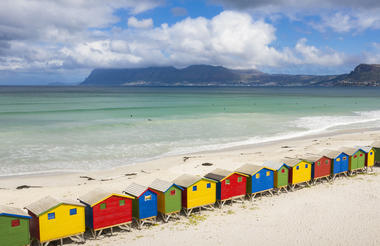
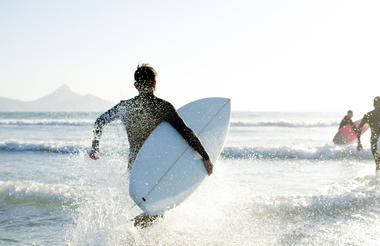
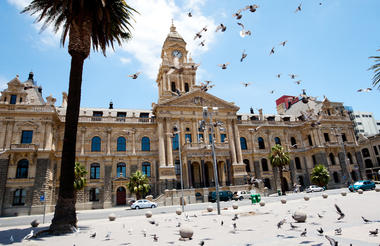
- Check-out: 07:50
- Depart : 08:00
- Travel from the Mother City into the Heart of the Greater Kruger (6h)
Enjoy your last morning breakfast overlooking the Atlantic Ocean, before departing to Cape Town International Airport for your scheduled commercial flight to Hoedspruit, the gateway to the Kruger National Park.
Arriving in Hoedspruit, you are transferred to the Manyeleti Game Reserve, sharing unfenced borders with the Kruger National Park, the world renowned Sabi Sands Game Reserve and the Timbavati Private Nature reserve, this is the perfect place to start your safari adventure.
Arrive at the camp and after a short safety briefing and camp orientation, you have time at leisure to relax and unwind before high tea is served in the main area of the lodge and your first exciting afternoon game drive departs.
- 13:00 Check-in Pungwe Safari Camp
- Pungwe Safari Camp has been operating on the same site for over 24 years.
If exclusivity is the true definition of luxury then with only four en-suite meru-styled tents, Pungwe Safari Camp offers the kind of intimacy one only finds in a truly unique authentic safari camp.
At Pungwe the ethos is to deliver a truly authentic safari experience with limited impact on the environment. Believing that the essence of any safari is best captured in the sights, sounds and smell of the bushveldt and our welcoming staff endeavour to create an environment in which these elements take centre stage so that you, our guests have a life altering experience.
Pungwe is situated in the remote and undeveloped southern portion of the Manyeleti Game Reserve. The 23,000 hectare Manyeleti Private Game reserve is located between the Timbavati and Sabi Sands Game Reserves and borders the world famous Kruger National Park. With just three lodges in this pristine wilderness area you can be sure to experience the best of South Africa far away from mainstream tourist areas. Manyeleti is one of those very few remaining 'secret places'. The Manyeleti is renowned for its large concentrations of game and relatively low levels of development guaranteeing exceptional game viewing with minimal vehicle densities.
The thatched roofs over each of the large tents ensures that the interiors remain cool in summer and mild in winter. The en-suite bathrooms with their free-standing hot showers, large baths, flushing toilets and intricately designed basins provide all the creature-comforts one expects. Each of the tents offers either twin or king-size options under four-poster style mosquito nets, providing protection and an ambiance reminiscent of a by-gone era, further enhanced by the soft glow of lanterns. The food is wholesome and often cooked over an open fire using locally sourced fresh produce.
Whether you are travelling with your partner for a romantic getaway of want to enjoy a perfect family holiday, we sure hope to welcome you soon iat Pungwe Safari Camp our wonderful little place under the stars.
- 16:00 Pungwe Safari Camp - Activities (1h)
Guided Morning Walking Safaris
Set out on foot just as the sunlight touches the horizon, feel the dew drops as you walk on animal tracks in search of a feeling that only a walking safari can give you, that inexplicable feeling felt by so many before that still captivates us, connects us and allows us to feel at one with nature. You will not only see the bush, but get to touch, taste and smell it as well, a true safari of the senses.
Our qualified, armed guides will share their intimate knowledge of the bush and each animal encounter will remain etched in your memory long after your travels have ended.
Afternoon/Evening Open Vehicle Safaris
In the afternoon and into the evening, using spotlights, our experienced guides will share all the sights and sounds of the Manyeleti Reserve with you. From the echoing call of the Monotonous Lark, to the infectious greeting of a pack of Wild Dogs reuniting after a hunt, you will see and hear things that only a safari in the African bush can deliver. If you want to capture your experiences, and the look that that leopard gave you, in pictures, the evening safaris are a delight.
Our guides will take you off-road for close-up sightings of lion, leopard, rhino, buffalo and stately elephants.



12:00 Morning Guided Safari Walk at Pungwe Safari Camp (1h)
Martin has grown up in the Kruger National Park, and nothing excites him more than venturing out at sunrise to explore the region on foot.
During your walk, Martin and the Camp Guide will show you all the microcosms that play a vital role in sustaining the larger eco-system. The intimate nature of walking safaris takes us back to a primal connection we have all shared with Africa - here the aim is to fall back into rhythm with this connection and be in tune with your senses and the area around you. The walk is approximately 3 hours, and takes you into the heart of the Greature Kruger National Park Biosphere, and while the opportunity exists to view the big 5 on foot from a safe distance, the morning walks focus more on the plants and their medicinal values, the birds, insects and host of other animals that call this magical piece of paradise home.
Return to the camp, where a delicious brunch awaits you, cooked over open fires there is no better way to end a morning walk, than with a traditional cup of "Moer Koffie" a ground coffee cooked over the open fire and served in an enamel mug.
This ultra-strong, dark brew probably derives from the old first language Dutch "moer", which means “layer of sediment”. Moer koffie is traditionally made with coffee grounds brewed (not boiled) in an enamel or aluminium pot on a over an open fire.
The rest of the day is spent at leisure until your afternoon game drive.



Start at 12:00
An evening around the Camp Fire with the Dugga Boys
After your evening Game drive, return to the camp where you have time to freshen up before drinks are served around the Pungwe Camp Fire.
Tonight you will be joined by two very special stalwarts or Dugga Boys (A Dugga Boy traditionally referres to the cantankerous old Buffalo Bulls who spend their time in mud wallows away from the rest of the Herd) in this instance however it is the affectionate term used to describe the stalwarts of the conservation industry, these are the men who have been on the forefront of conservation for decades.
Michel Girardin has been working in the Greater Kruger National Park for more than 36 years, and what most young conservationists still need to learn, Michel has experienced first hand. Starting at Sabi Sabi, and eventually settling down near Hoedspruit, Michel has been a custodian of the Manyeleti for a number of years. Fluent in Xitsonga Michel, or Mich as he is affectionately known by his inner circle is a Numzaan (the Shangaan name for leader) amongst the guides, trackers and community elders and he is often called upon for guidance and counsel in matters relating not only to conservation but the people that play an active role in conserving our wilderness areas. His insight into the subtle nuances of nature, wildlife and community provides incredible opportunities for fireside chats. Michel is now highly sought after as a consultant in the eco-tourism field and his consulting experience, in places as varied as Madagascar and Buhtan stands him in good stead as an authority on all matters conservation.
Mike Lawrie's heart lies in ensuring that communities and wildlife are able to co-exist peacefully. Mike had a lightbulb moment, a number of years ago, while staying at a deluxe 5 star lodge, nestled under Egyptian Cotton Sheets, after having had an incredible meal, that as the crow flies a few kilometers away there was a community living on the fringes of the reserve, without proper running water, and no electricity. This ignited a passion to motivate lodges in the greater Kruger National Park to do better, and get more involved with communities. Speaking Zulu fluently Mike has always been a bridge between traditional communities and lodges, ensuring that the land and communities are respected in equal measure. Having spent more than a decade as a General Manager helping commercialize new safari offerings, and running established big name luxury lodges, Mikes' knowledge of luxury eco-tourism goes hand in hand with community upliftment, and the mitigation of human wildlife conflict. Mike has spent the last few years developing a collection of lodges in the Hoedspruit area and heads up an environmentally friendly Canvas Company, putting tents where no man has put tents before.
Michel, Mike and Martin, the Dugga Boy collective and triple M threat will spend the evening discussing real "boots on the ground" conservation and delighting you with wonderfully entertaining stories of their escapades through the Wilds of Africa. If these three men could sit still long enough to write a book, it would be an instant best seller.
When these three are not saving the natural world, or guiding you can normally find them bumbling through the Kruger National Park, and running into each other in weird and wonderful places as they continue their journeys to do good and make a difference on the African Continent.



08:00
Check-out
12:00
Departure from Pungwe Safari Camp
Travel from the Manyeleti to the Timbavati Private Nature Reserve (2h)
Enjoy your last morning activity at Pungwe, before returning for a delicious breakfast and check out procedures.
At a time advised by Camp Management, you will be collected from Pungwe and transferred to the Timbavati Private Nature Reserve. The Timbavati lies at the centre of Martin's heart. Having guided here for more than 14 years, there are few areas of this 53 000 hectare reserve that he has not explored.
Timbavati’s best-known residents are undoubtedly its white lion population – the result of a naturally occurring recessive gene that causes leucism, a partial loss of pigmentation of the skin (as opposed to albinism, an absence of colour-giving melanin that affects the skin, feathers, hair and eyes of animals).
A recent uptick in white-lion births has reminded many old Kruger hands of the origin of the name Timbavati: it derives from a Shangaan expression meaning ‘the place where something sacred came down to earth from the heavens’. It could be said that the lions have come home: the varied, undulating landscapes, seasonal rivers and low density of lodges make Timbavati the safari equivalent of heaven on earth.
- Lunch is served in camp, overlooking the waterhole. Keep an eye out for the playful elephants that often come to slake their thirst here in the heat of the midday African sun
- 14:00 Check-in at Rockfig Safari Lodge
You have the rest of the afternoon at leisure. High tea is served at the lodge before you embark on your exciting evening game drive.
- 16:00 RockFig Safari Lodge Activities (4h)
Spend 3 hours exploring this unique region in search of the famed white lions of the Timbavati.
Return to the lodge after dark, for drinks by the fire before enjoying a delicious dinner. Your evening is spent at leisure, unwinding around the camp fire or indulging in a decadent bubble bath overlooking the bushveld.
Morning and afternoon/evening game drives
Heading out on game drives from RockFig Safari Lodge gives guests the chance to get in tune with the Timbavati wilds, and see how the professional guides and trackers read the signs of the bush to anticipate the movements and behaviour of birds and animals for the best possible viewing and photographic opportunities.
Bush walks can be combined with the game drives should the guests wish to do so.
Kids receive an activity pack which includes an activity book. The guides help the kids to work through their book and at the end of the stay they receive a certificate
Bush dining, including breakfasts, picnics and dinners
Bush Breakfast- This includes a lovely full continental breakfast. Guests are able to enjoy a hearty meal, surrounded by nature.
Bush breakfast is however weather dependant.






10:00
- An insight into the poaching plight (4h)
After your morning game drive and breakfast, depart the lodge for a short transfer into the town of Hoedspruit.
Here you will meet the true hero’s in the battle against poaching.
We stop at Hoedspruit Civil Airport at a private hangar, where Big Game Helicopter Pilot, Gerry McDonald is available to give you some insight into the day to day struggles that he and various teams in the region face in terms of counter poaching initiatives, from flying Vets to dart Rhino’s for dehorning, assisting Anti-Poaching units with patrols, live flying orphaned rhinos to sanctuaries to delivering K9 units to reserve to assist in apprehending poachers. Gerry is a lifeline in assisting units across the region by mobilizing quickly and being the eyes in the Air.
Gerry and his famous yellow helicopter are always a sight to behold. Here you can do a quick helicopter flight with the infamous ‘GeryHeli’ to see what it is like having to maneuver and fly in the African Bushveld.
Following Gerry’s talk you will have a talk by Dr. Peter Rogers - with over 30 year’s experience.
Dr Peter Stewart Rogers is considered one of the most experienced wildlife veterinarians in the world. He specializes in the capture and veterinary care of some of South Africa’s most endangered species, including the southern white rhinoceros, black rhinoceros, African elephant, cheetah, African wild dog, African Lion, Temminck’s ground pangolin and many other species.
A light picnic lunch is served at the Hangar before a meet and greet with two ambassador members of a K9 unit, Jamala and Izzie, these two girls are ambassadors for the Belgian Malinois breed.
Martin Meyer & Antje Mouton have spent years training conservation ambassadors, counter poaching units, and participing in the front lines of human/wildlife conflict mitigation.
This unique opportunity will allow you to get an intimate understanding into the hard work and dedication that goes into training K9 units and handlers and how they can also assist in mitigating Human-Wildlife Conflict.
A short detection and search demonstration will take place before returning to the lodge in time for your afternoon game drive.



Enjoy your last morning activity at Rockfig Safari Lodge before returning to the lodge for breakfast and check out procedures.
- 10:00 Departure from Rockfig Safari Lodge
At a time advised by Camp Management, you will bid Martin Farewell and board your private transfer to Hoedspruit Airport. In Hoedspruit you will board your scheduled commercial flight to Johannesburg. Here you are met airside by a local representative who will assist you with check in procedures for your international departure flights and through customs.



